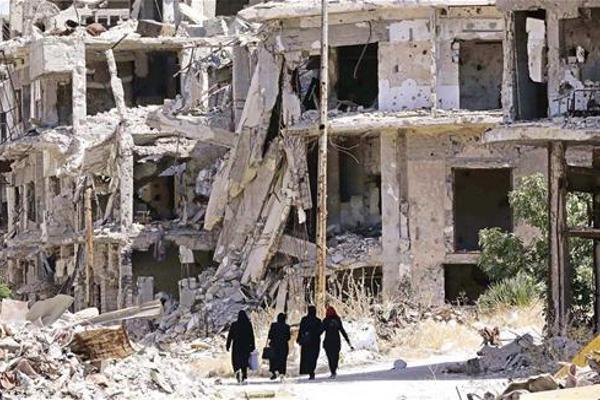Syria has become ‘torture chamber’: UN rights chief
GENEVA


“As the conflict enters its seventh year, this is the worst man-made disaster the world has seen since World War II,” Agence France-Presse quoted Zeid Ra’ad al-Hussein, the U.N. High Commissioner for Human Rights, as saying about the conflict that has killed 320,000.
Millions forced to flee their homes since the conflict erupted in March 2011, as protests against Syrian President Bashar al-Assad morphed into war following a government crackdown.
In an address to the U.N. Human Rights Council, Zeid said his office had been refused access to the country and that no international human rights observers had been admitted to places where “very probably tens of thousands of people are currently held. They are places of torture.”
“Indeed, the entire conflict, this immense tidal wave of bloodshed and atrocity, began with torture,” he said, citing as an example the torture of a group of children by security officials over anti-government graffiti six years ago.
“Today, in a sense, the entire country has become a torture chamber, a place of savage horror and absolute injustice,” he said.
The U.N. and other organizations have repeatedly accused the Syrian authorities of widespread torture.
Amnesty International said in a report last August that an estimated 17,700 people had died from torture in custody since the beginning of the conflict, while the Syrian Observatory for Human Rights put the number at a minimum of 60,000.
Many others have been executed, and far more have simply disappeared, according to the reports.
“We’re speaking of a daily continuous massacre that has been going on for six years,” Mazen Darwish, a Syrian lawyer who was detained for more than three years, told the U.N. rights council.
“While we are here today, there are civilians, women, children, innocent people who are being killed under torture,” said Darwish, one of several Syrian victims and activists who spoke to the council during a special session on Syria.
Syria deliberately bombed Damascus water supply: UN
Meanwhile, the U.N. Independent International Commission of Inquiry on Syria said on March 14 that Syria’s air force deliberately bombed water sources in December 2016, a war crime that cut off water for 5.5 million people in and around the capital Damascus.
The commission said it had found no evidence of deliberate contamination of the water supply or demolition by armed groups, as the Syrian government maintained at the time.
Rebels had controlled the springs of the Wadi Barada valley, northwest of Damascus since 2012 and faced a major offensive by Syrian government forces and their allies, despite a cease-fire deal. The rebels withdrew at the end of January.
The commission, led by Brazilian investigator Paulo Pinheiro, said there were no reports of people suffering water contamination on or before Dec. 23, 2016, when the Syrian air force hit al-Fija spring with at least two air strikes.
“While the presence of armed group fighters at [the] spring constituted a military target, the extensive damage inflicted to the spring had a devastating impact on more than five million civilians in both government and opposition controlled areas who were deprived of regular access to potable water for over one month,” the commission’s report said.
“The attack amounts to the war crime of attacking objects indispensable for the survival of the civilian population, and further violated the principle of proportionality in attacks.”
The commission’s conclusions were based on interviews with residents and satellite imagery, as well as publicly available information.
The report, which covered the period between July 21, 2016, and Feb. 28 this year, came less than two weeks after the commission said that Syrian government aircraft deliberately bombed and strafed a humanitarian convoy, killing 14 aid workers, in September last year.
In a separate incident, aircraft – most likely Syrian or Russian – bombed the longstanding headquarters of the Syrian Arab Red Crescent in the town of Idlib, the March 14 report said.
The commission also documented the use of lethal chlorine gas on multiple occasions by government and pro-government forces, in the suburbs of Damascus and Idlib province.
There was no evidence of Russian involvement in chlorine attacks, the report said.
